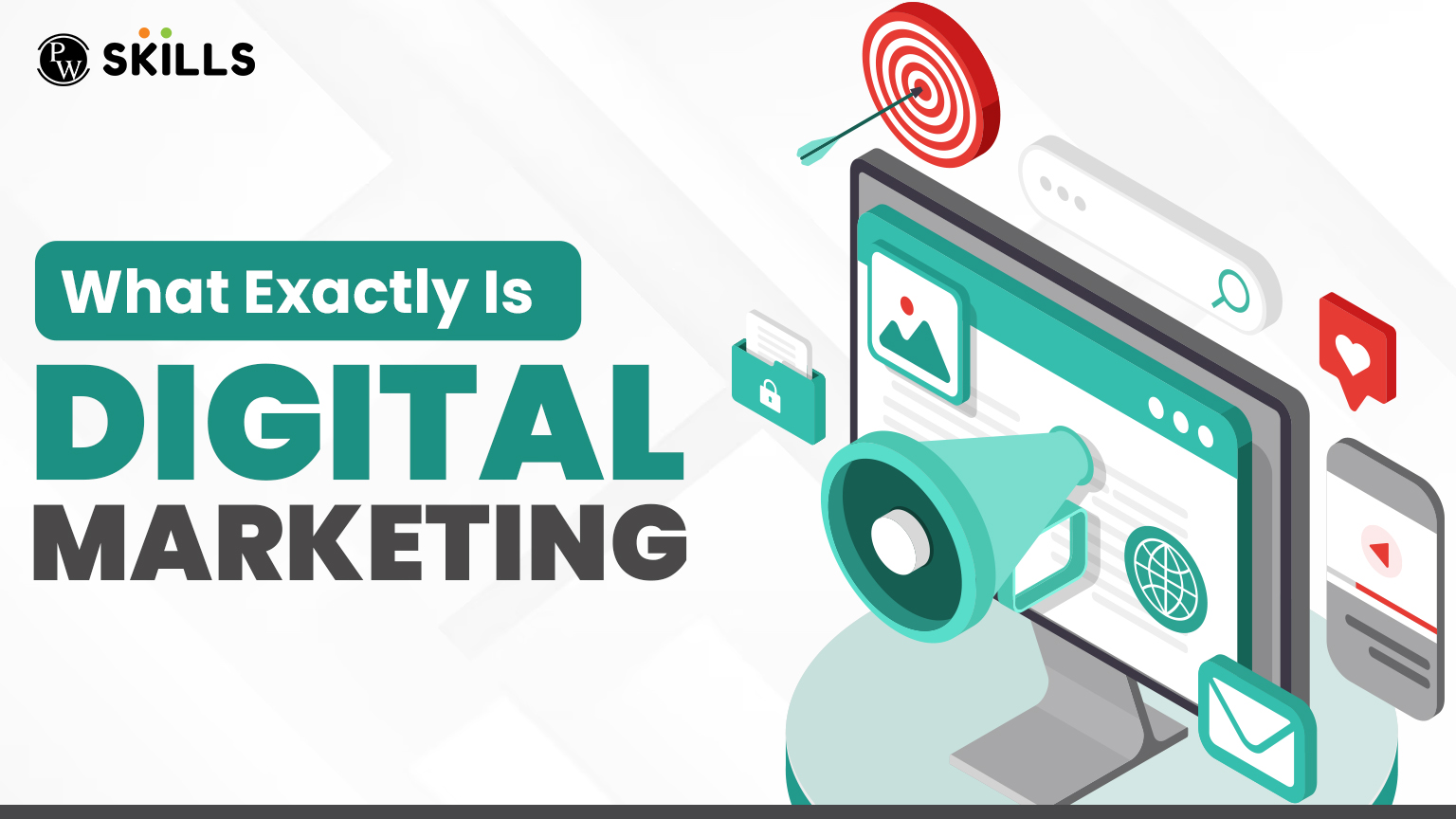What exactly is digital marketing? Digital marketing refers to the use of online platforms, digital channels, and technologies to promote products, services, and brands. Unlike traditional marketing, which relies on physical media like print or TV ads, digital marketing utilizes the Internet, social media, search engines, email, and other digital tools to reach and engage with a target audience.
It offers a wide range of tactics, including SEO (search engine optimization), content marketing, PPC (pay-per-click) advertising, email marketing, social media marketing, and more. The goal is to build brand awareness, drive traffic, and convert leads into customers. With its ability to offer measurable results and real-time adjustments, digital marketing has become essential for businesses aiming to succeed in today’s competitive online environment.
What Exactly is Digital Marketing?
Digital marketing refers to the use of digital channels, platforms, and technologies to promote products, services, or brands to a target audience. It encompasses a wide range of tactics, including search engine optimization (SEO), content marketing, social media marketing, email marketing, paid advertising, and more. Unlike traditional marketing methods, digital marketing enables businesses to connect with customers in real time, track performance, and tailor their strategies based on data.
It leverages online platforms such as websites, social media, and email to engage potential customers and drive conversions. As more people spend time online, what exactly is digital marketing has become an essential tool for businesses to stay competitive and reach a global audience effectively.
Why is Digital Marketing Important?
Digital marketing allows brands to reach and interact with their target audience in ways that traditional marketing simply cannot match. Below are some key reasons for what exactly is digital marketing? It is important for any business:
- Wider Reach and Global Access: Digital marketing allows businesses to reach a global audience. Unlike traditional marketing, which may be limited to specific regions or areas, digital marketing offers the possibility to target markets worldwide through online platforms.
- Cost-Effective: Digital marketing campaigns are often more affordable compared to traditional marketing strategies like print, radio, or TV ads. Businesses, especially small and medium-sized enterprises (SMEs), can effectively reach their target audience without breaking the bank.
- Better Targeting and Personalization: Through digital marketing, businesses can use data analytics and audience insights to target customers more accurately. With tools like Google Ads and social media advertising, you can segment your audience based on demographics, interests, behaviors, and more.
- Measurable Results: One of the major benefits of digital marketing is the ability to track and measure results in real-time. Tools like Google Analytics and social media insights allow businesses to see how well their campaigns are performing and make adjustments if necessary.
- Improved Customer Engagement: Digital marketing offers opportunities for ongoing interaction with customers through social media, emails, and live chats. This helps build customer loyalty and creates a platform for immediate feedback, enhancing overall customer satisfaction.
- 24/7 Availability: The internet never sleeps. Digital marketing allows businesses to market and interact with customers at any time, reaching them whenever they are online.
- Increased Conversion Rates: Since digital marketing strategies often include more targeted outreach and personalized experiences, the chances of converting visitors into actual customers are higher.
How to Create a Digital Marketing Strategy
Creating a digital marketing strategy can be challenging for many small businesses and beginner digital marketers. However, by following these steps, you can develop a successful digital marketing strategy that drives brand awareness, engagement, and sales. Here’s how to get started with what what exactly is digital marketing in mind:
1. Set SMART Goals
Setting SMART goals (Specific, Measurable, Achievable, Relevant, and Timely) is essential for any effective digital marketing strategy. While you may have numerous goals in mind, focus on the ones that will drive progress and help your strategy grow. Instead of trying to achieve too many goals, identify a few that will significantly impact your business’s growth and success in digital marketing.
2. Identify Your Audience
Before launching any digital marketing campaign, it’s crucial to identify your target audience. Your target audience is the specific group of people you want your campaign to reach, based on attributes such as age, gender, interests, demographics, and purchasing behavior.
Understanding your audience will help you choose the most effective digital marketing channels and tailor your messaging accordingly. The better you know your audience, the more successful your digital marketing strategy will be.
3. Create a Budget
A well-defined digital marketing budget ensures you are spending your money efficiently. Consider your SMART goals and the digital marketing channels you will be using when creating your budget.
This step helps prevent overspending on platforms or strategies that may not deliver the desired results. A good budget ensures you’re focusing on the right channels for your digital marketing objectives.
4. Select Your Digital Marketing Channels
There are many digital marketing channels to choose from, such as content marketing, social media marketing, email campaigns, PPC (Pay-Per-Click), SEO, and more. The channels you select depend on your SMART goals, budget, and target audience.
For example, if your goal is to generate leads, you might use a mix of PPC campaigns and content marketing. Choosing the right digital marketing channels is key to reaching your audience effectively.
5. Refine Your Marketing Efforts
Once your campaign is over, it’s essential to analyze the results. Review the data to identify what worked and where there’s room for improvement. By understanding your campaign’s performance, you can refine future efforts. With the help of digital marketing tools and analytics software, like Mailchimp, you can easily monitor all your campaigns from one centralized location.
Digital marketing analytics will provide insights that help you optimize your strategy and make informed decisions moving forward.
General Digital Marketing
- Introduction to Digital Marketing
- Digital Marketing Basics
- Digital Marketing Strategy
- What is Digital Marketing?
- Digital Marketing Explanation
- What are the 4 Types of Digital Marketing?
- Digital & Social Media Marketing
- Digital Marketing Services
- Digital Marketing Plan
- Digital Marketing Course & Placement
- Digital Marketing Modules
- Digital Marketing Jobs in India
- Digital Marketing Firms
- Top 20 Digital Marketing Interview Questions (2025)
- 15 AI Tools to Supercharge Digital Marketing
- Digital Marketing Books
- Digital Tools
- Digital Platform
- Learn Digital Marketing
- Digital Marketing Tutorial
- How Does Digital Marketing Work
- Components of Digital Marketing
- Digital Marketing What Is
- Kinds of Digital Marketing
- Digital Marketing Types
- Marketing Digital Marketing
- Digital Marketing Marketing
- Father of Digital Marketing
- Traditional Marketing vs Digital Marketing
- Digital Marketing Examples
Learn Digital Marketing With PW Skills
Start your own digital marketing company or become a digital marketing expert with our comprehensive PW Skills Digital Marketing course.
This course is specially designed to equip you with the essential skills and in-demand concepts of Digital Marketing with the knowledge of Artificial Intelligence in a beginner-friendly manner.
Some key features of this 6-month-long job assistance program that make it a standout choice in the market include: Live lectures with Experts, regular practice sheets, daily doubt-clearing sessions, a 100% placement assistance guarantee, interview opportunities with partnered companies, industry-recognized certificates, and much more.
What Exactly Is Digital Marketing FAQs
How does digital marketing differ from traditional marketing?
Unlike traditional marketing methods (such as TV, radio, and print ads), digital marketing takes place online, allowing businesses to reach a broader audience, engage with them in real-time, and measure the effectiveness of their campaigns more accurately.
Why is digital marketing important?
Digital marketing is important because it helps businesses reach a global audience, target specific customer segments, and deliver personalized experiences. It’s also cost-effective and provides measurable results, allowing businesses to track and optimize their campaigns for better performance.
What are the key components of digital marketing?
The key components of digital marketing include SEO (Search Engine Optimization), PPC (Pay-Per-Click), social media marketing, email marketing, content marketing, affiliate marketing, and online public relations.


